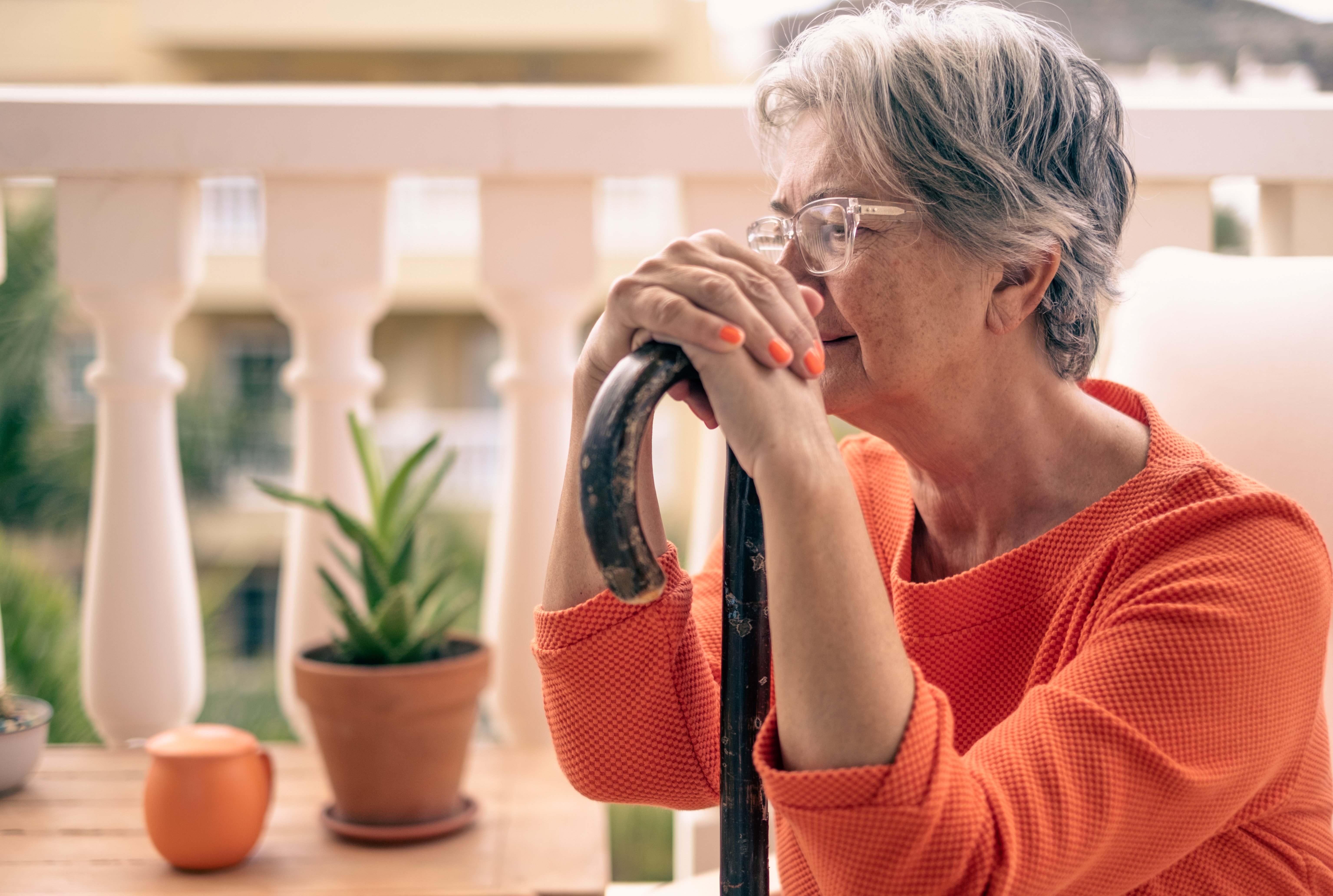Depression in older adults: How caregivers play a key role in treatment
by Katie Wright | May 11, 2021 | depression, Coping with Senior Depression, Paid caregiving | 0 Comments

Caregivers, you play an essential part in the health and welfare of your aging loved ones.
What you do on a daily basis is nothing short of life-sustaining. A typical day’s work includes many of the following responsibilities and more:
- assessing medical needs and developing a care plan
- helping with activities of daily living (ADLs)
- monitoring medications
- preparing meals and grocery shopping
- assisting with daily housekeeping
- helping with moving and mobility
- providing transportation, and
- being a companion.
There’s another crucial activity that caregivers develop a special skill for, and it needs extra emphasis – observing. It’s an important first step in identifying symptoms of depression that may have gone unnoticed.
Many seniors are hesitant to talk about emotional struggles and some may be unaware they’re displaying symptoms of depression. This adds to the challenge of recognizing it.
In this article, we’ll consider why observation is such a valuable tool, what to look for, and what steps caregivers can take to help aging loved ones with the challenge of depression.
As we highlight National Mental Health Awareness Month, SeaCare would like to emphasize the importance of recognizing depression. Read our previously published posts about it HERE and HERE.
Depression left untreated has a significant impact on quality of life and may affect up to 25% of older adults. We want to make monitoring mental health as much a part of regular health care as standard medical checkups.
How caregivers can sharpen their observation skills
You get a lot of useful health information from conditions that are easily measured. Cholesterol tests, weigh-ins, blood pressure checks, and hearing evaluations provide updated numbers that are compared to baseline and evaluated for treatment. This visible, measurable data provides solid evidence of your health status.
But depression is largely invisible and not as easily diagnosed as other conditions. Instruments like the PHQ-9 (Patient Health Questionnaire) and the GDS (Geriatric Depression Scale) offer a range of scores for evaluating depression and are useful for diagnosis by a trained professional.
But as you look at the questions, it’s clear that a good assessment depends on the respondent’s willingness to answer honestly. Many older adults do not wish to label their distress as a mental health condition and may hesitate to self-report.
This is why your skills of observation as a caregiver are crucial. Being aware of how your loved one looks, sounds, and behaves is the most important tool in your kit. Considering how these characteristics may have changed recently or over time provides you with vital information you’ll need to evaluate the need for next steps.
To repeat – observing how your senior’s characteristics are changing is the key to understanding when you need outside help. Keeping track with a daily journal or calendar can supply useful information for health care providers.
Be aware of changes your older adult has been through with their interpersonal relationships or their living situation, for example. If they’re prescribed new medications, side effects can alter behavior or mood.
Pay attention not only to what they say but how they say it. And what they don’t say. Watching for nonverbal cues and doing so in a neutral, non-judgmental way helps you to absorb information without distorting it.
Plan to openly discuss what you see. Regularly using a straightforward approach can help make your parent feel more at ease.
As a caregiver, there will be times you feel overwhelmed and in need of assistance. We can help. At SeaCare, support, observation, and weekly reports are key elements of the personalized care we offer your loved one.
How symptoms of depression are exhibited
This is a good place for a reminder. Feeling depressed, sad, or blue is a normal occurrence for most people, especially following disappointment or a loss.
Feeling depressed is not the same as depression. Furthermore, depression is not a normal part of aging. It is, however, the most common mental health issue for older adults.
Depression is often a combination of things that affect your aging parent’s mobility, their sleep habits, and how they eat. They may not be able to enjoy things that used to be meaningful.
Depression can masquerade as physical problems like unexplained headache or fatigue. Your loved one may complain of discomfort but not necessarily mention feeling distressed. They may downplay or not admit to certain symptoms of depression, but there might be other cues like tears or a quieter tone of voice.

Other noticeable symptoms may include:
- worry
- memory loss
- poor hygiene or sudden neglect of hygiene
- anxiety
- confusion
- agitation.
The Diagnostic and Statistical Manual of Mental Disorders (4th edition, text rev.) (American Psychiatric Association, 2000) also includes these symptoms:
- depressed mood most of the time
- loss of interest or pleasure in activities
- disturbed sleep (sleeping too much or too little)
- weight loss or gain (changes in appetite)
- fatigue or a lack of energy
- feelings of worthlessness or extreme guilt
- difficulties with concentration or decision making
- noticeable restlessness or slow movement
- frequent thoughts of death or suicide, or a suicide attempt.
While these symptoms can occur after a loss or troubling diagnosis, for example, the key to suspecting depression is if your older adult has experienced several of them for 2 weeks or longer.
Here’s a simple and straightforward presentation on depression that may increase understanding for both you and your aging parent. This 4-minute animated TED-ed talk – “What is depression?” - is excellent.
As a caregiver, sharpening your radar and closely observing your loved one can help you determine how persistent their concerns and behaviors are.
And when it’s time to seek help.
How caregivers can help make informed treatment choices
Remember, the symptoms discussed so far are not necessarily indications of depression. Observing them, however, can cue you into your loved one’s general feelings of discomfort or distress and there may be ways for you as the caregiver to help alleviate their problems.
For example, when you notice trouble with concentration, sleep disturbance, or lack of energy, think about your senior’s eating habits and whether they’re getting enough exercise. Encouraging small, well-balanced meals can help and short naps can be useful.
If headache or other unexplained pain is a problem, keep a journal of frequency and duration. Ask when it started, if there’s anything that makes it feel better or worse, and how intense it is. If it’s not acute, offer low-volume, calming music or read to your aging parent to help distract from the pain.
When your loved one’s mood is melancholy, one of the best things you can do is put everything else aside and simply be there with them. Increase the amount of time you spend if possible. Talk, read, or pass some time doing things you know have been sources of pleasure for them. Simply having you there can do wonders.
If it’s time for professional assessment, determine whether your senior is hesitant to seek advice. There’s a stigma associated with mental illness, and they may be concerned about what friends or family might think. Help them to understand that depression is a medical illness and that there are effective treatments for it.
Openly talking about depression can help to ease your loved one’s concerns about the stigma. It may pave the way for them to seek help.
Bear in mind that even taking simple first steps to get treatment can feel overwhelming to someone who’s depressed. You can help by offering to research therapists or by helping your older adult prepare questions to ask.
Start with your older adult’s primary care provider. While some practitioners have specific mental health training, others do not, and it’s appropriate to ask for a referral to a specialist. Some points to ask about (from The Treatment of Depression in Older Adults, US Department of Health and Human Services, Evidence-Based Practice Kit, 2011) include:
- What treatment options are right for me?
- Will treatment include therapy, antidepressants, or both?
- How might antidepressants affect my other medical conditions?
- How long do I have to take antidepressants?
- Does my health insurance cover this treatment?
- How long before my treatment begins to work?
Find a complete list of local mental health/behavioral health services HERE.
There are self-help activities that can enhance a provider’s treatment recommendations. In addition to working with a mental health specialist, some seniors might consider adopting a regular exercise regimen, consulting a nutritionist to learn about foods to include or avoid, and reading about ways to reduce symptoms.
At SeaCare we understand that family caregivers are involved with their older adult’s care at all levels — physical, cognitive, and emotional. Let us help you develop a plan and find balance while providing the best for your loved one.
Reference: US Dept. of Health and Human Services
Katie Wright writes about aging and senior wellness from Bellingham, WA. You can read more about her here.
If you or a loved one you know are looking for additional support during this time and are interested in scheduling a free in-home assessment, please contact SeaCare In-Home Care Services today! A SeaCare family member is standing by. 425-559-4339.



0 Comments